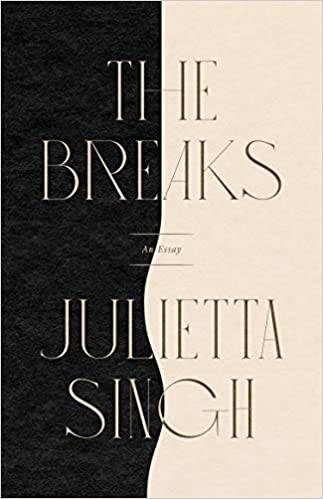by Julietta Singh
Coach House Books
171 pages
$20.95
Julietta Singh’s The Breaks is at once a letter, a memoir, and a work of narration. In addressing her six-year-old daughter, Singh’s storytelling is, for the next generation, “a map of broken things, a recyclable archive that will spur you to fashion other ways of being alive, of living.” Singh presents parenthood and pedagogy with urgency, a process of “learning to mother at the end of the world” against the onslaught of environmental destruction and late capitalism, while her daughter, a little brown girl, has already started to navigate American racial and gender dynamics.
Singh takes up ‘the breaks’ in varying ways: The bodily break of a fractured bone that is left to over-heal with extra calcium, the inevitable break that comes between generations in loss and disconnect, and the hopeful break from a capitalism-ingrained way of life to an alternate world. For Singh, break from is a loss that is necessary to survival, but breaking with can make room for collective healing and renewal.
What does it mean to have a child at the end of the world? The break also takes the form of pedagogy; in addition to providing a child with a toolbox of archived stories, parenting can be “reconceived as life’s most enduring act of radical pedagogy” in unlearning the world with a new life. The reader is invited on this journey of experimental unlearning, in ways such as queer family-making and
radical resource sharing. In doing so, a reader might find themselves spoken to as both potential elders and an inheriting generation, perhaps exposing their own relationships to parenthood. The second-person narration brings the reader into an intimate epistolary, blurring the (arguably already inseparable) boundaries between the personal and political. The Breaks illustrates this inseparability by rescaling personal desires for a biological child with themes of radical pedagogy and the intervention that the world needs. However grandiose, these themes must also make peace with the environmental and moral impacts of bringing a child to the end of the world.
Elders, inheritors, and anyone in between can benefit from the narration of The Breaks by approaching it as it was intended—as a selection of knowings from which one can choose their inheritances among the unrealized dreams for liberation and survival beyond the end of the world. As a map of makeshift pathways and ongoing fights for survival, The Breaks ultimately reveals the too-daunting task of being a child at the end of the world, tasked with finding a yet-unrealized way of survival for themselves.
—Lucy Zi Wei Fang














